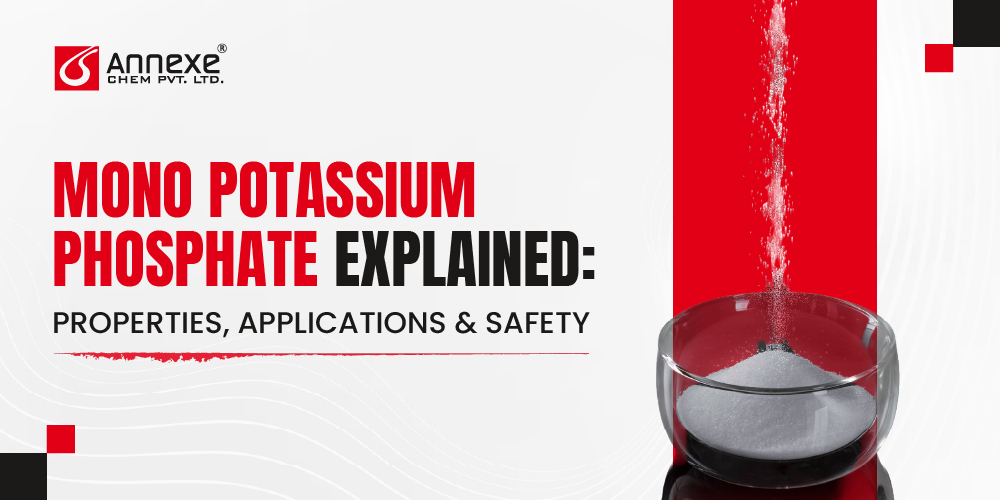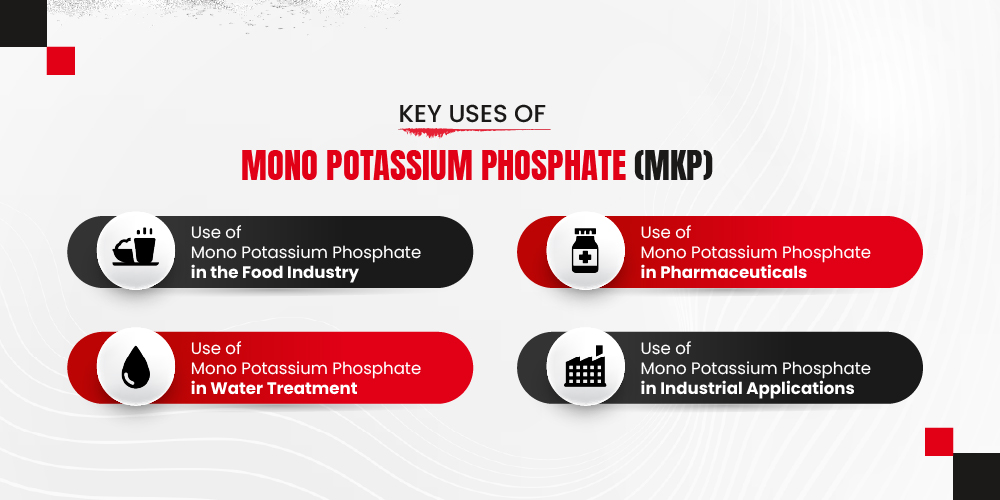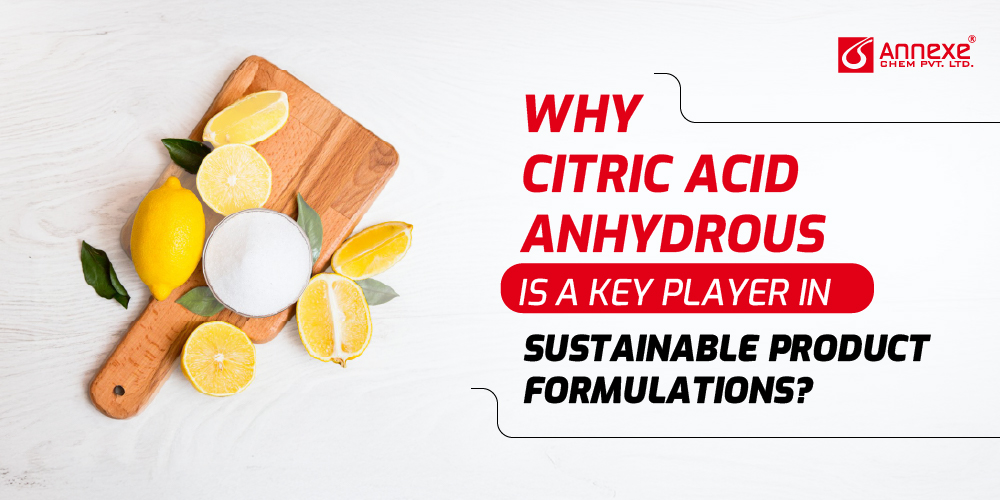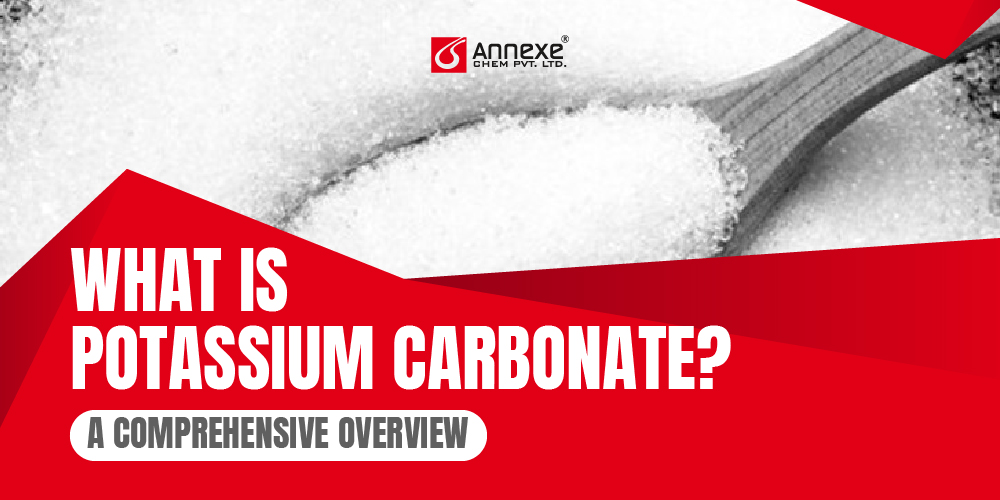Mono Potassium Phosphate: Uses, Benefits & Safety
Mono Potassium Phosphate Explained: Properties, Applications & Safety

- March 15, 2025
- By Akshita Patel
What if a single compound could revolutionize plant growth, enhance food preservation, and even improve industrial processes? Meet Mono Potassium Phosphate (MKP)—a versatile, water-soluble powerhouse used across agriculture, food, and industry.
From boosting crop yields to stabilizing pharmaceuticals, MKP plays a crucial role in everyday applications. But what makes it so effective, and why is it gaining popularity? Let’s dive into the science, benefits, and uses of this essential compound.
What is Mono Potassium Phosphate (MKP)?
Chemical Composition
Mono Potassium Phosphate (MKP) is an inorganic compound with the molecular formula KH₂PO₄. It consists of:
- Potassium (K) – Essential for plant growth and metabolic functions.
- Phosphorus (H₂PO₄) – A key nutrient that supports root development and energy transfer in biological systems.
Structurally, MKP is a highly soluble salt that dissociates in water, releasing potassium and phosphate ions, making it an ideal source of these essential nutrients in agriculture, food, and industrial applications.
Physical Properties
- Appearance: MKP is a white, crystalline powder or granules with no odor.
- Solubility: Highly water-soluble, dissolving quickly to form a clear solution. This property makes it suitable for liquid fertilizers, foliar sprays, and hydroponics.
- Stability: MKP is stable under normal conditions but is hygroscopic, meaning it can absorb moisture from the air. Proper storage in airtight containers is recommended to maintain its quality.
Because of its neutral pH and high purity, MKP is widely used in fertilizers, food additives, pharmaceuticals, and industrial processes where potassium and phosphate are needed in a balanced form.
Benefits of Using Mono Potassium Phosphate (MKP)
1. Highly Soluble: One of the standout qualities of MKP is its high solubility in water, making it an excellent choice for fertigation, foliar sprays, and hydroponic systems. When dissolved, it provides plants with an immediate source of potassium and phosphorus, essential nutrients for strong root development, flowering, and fruit production. This ensures efficient nutrient absorption and reduces the risk of soil nutrient loss.
2. Eco-Friendly & Safe: MKP is a chloride-free and sodium-free fertilizer, making it a safe option for plants, soil, and water bodies. Unlike chemical-heavy alternatives, it does not contribute to soil salinity or harm beneficial microorganisms. When used correctly, MKP has a minimal environmental impact, as it does not lead to excessive runoff or contamination of water sources.
3. Boosts Industrial Efficiency: Beyond agriculture, MKP serves as a stabilizer and buffering agent in various industrial applications. Its ability to regulate pH levels makes it useful in food processing, pharmaceuticals, and chemical manufacturing. In the food industry, it helps maintain the quality and consistency of processed products, while in industrial applications, it enhances reaction stability and product shelf life.
With its versatility, efficiency, and eco-friendly nature, MKP continues to be a preferred choice across multiple industries.

Key Uses of Mono Potassium Phosphate (MKP)
Mono Potassium Phosphate is a highly versatile compound with applications across multiple industries, thanks to its water solubility, non-toxic nature, and balanced composition of potassium and phosphorus. Whether used in agriculture, food production, pharmaceuticals, or industrial processes, MKP plays a vital role in enhancing efficiency and product quality.
Use of Mono Potassium Phosphate in the Food Industry
In the food processing industry, MKP serves as a food additive, stabilizer, and acidity regulator, ensuring the quality, taste, and shelf life of various products.
Key Applications in Food Processing
- Leavening Agent: MKP is used in baked goods to help the dough rise, resulting in fluffier bread, cakes, and pastries.
- Dairy Industry: It helps maintain the texture and consistency of cheese, yogurt, and milk-based products.
- Beverages: MKP is added to fruit juices, soft drinks, and sports beverages to regulate acidity and improve flavor stability.
- Processed Meats: It enhances moisture retention in sausages, hams, and processed meats, preventing dryness.
Why is MKP Used in Food?
- Non-Toxic & Safe: Approved by food safety authorities like the FDA and EFSA.
- Enhances Shelf Life: Acts as a preservative by stabilizing pH and preventing microbial growth.
- Neutral Taste: Does not alter the natural flavors of food.
Use of Mono Potassium Phosphate in Pharmaceuticals
MKP is an essential ingredient in medicines and dietary supplements due to its role in maintaining electrolyte balance and pH stability.
Key Pharmaceutical Applications
- Electrolyte Supplements: MKP is used in intravenous (IV) fluids to correct potassium deficiencies, especially in hospitalized patients.
- Dietary Supplements: It is included in multivitamin and mineral formulations to support bone health, muscle function, and nerve signaling.
- pH Stabilizer in Medicines: Many liquid medications, syrups, and injectable drugs use MKP as a buffering agent to maintain stability and effectiveness over time.
Health Benefits of MKP in Pharmaceuticals
- Helps prevent muscle cramps and fatigue by replenishing potassium levels.
- Supports bone strength by providing phosphorus, a key component of bone mineralization.
- Enhances the absorption of other minerals like calcium and magnesium in the body.
Use of Mono Potassium Phosphate in Water Treatment
MKP plays a crucial role in municipal and industrial water treatment systems, helping regulate pH levels and prevent corrosion.
How MKP is Used in Water Purification
- pH Buffering: MKP helps maintain optimal acidity or alkalinity, preventing extreme pH shifts that can affect water quality.
- Corrosion Prevention: In boilers, cooling towers, and industrial pipelines, MKP reduces the risk of scale buildup and metal corrosion.
- Drinking Water Treatment: Used in municipal water facilities to help balance phosphate levels, ensuring safe and clean drinking water.
Advantages of MKP in Water Treatment
- Prevents pipe damage in industrial water systems.
- Improves the efficiency of water filtration processes.
- Reduces contaminants that can affect drinking water taste and safety.
Use of Mono Potassium Phosphate in Industrial Applications
MKP’s chemical properties make it a valuable ingredient in various industrial processes, ranging from fire retardants to ceramics and detergents.
Industrial Uses of MKP
- Fire Retardants: MKP is a key ingredient in fire-resistant coatings used on textiles, wood, and construction materials.
- Ceramics & Glass Manufacturing: Acts as a fluxing agent, reducing the melting point of raw materials and improving the durability of ceramics and glass.
- Detergents & Cleaning Agents: Enhances the effectiveness of laundry detergents, dishwashing liquids, and industrial cleaners by softening water and stabilizing pH.
Why MKP is Used in Industry?
- Non-Corrosive: Does not cause damage to machinery or surfaces.
- Highly Soluble: Easily mixes with other ingredients in liquid and powder formulations.
- Environmentally Friendly: Biodegradable and does not release harmful byproducts.
MKP is much more than just a fertilizer—its applications extend into food production, pharmaceuticals, water treatment, and industrial manufacturing. Thanks to its high solubility, stability, and eco-friendly nature, MKP continues to be a critical ingredient in various industries worldwide.
Safety, Handling, and Storage of Mono Potassium Phosphate (MKP)
Proper handling and storage of Mono Potassium Phosphate (MKP) are essential to maintain its effectiveness and ensure safety in agricultural, industrial, and commercial applications.
Safe Usage Guidelines
- Use Protective Gear: Wear gloves, goggles, and a mask when handling MKP in powder or granular form to avoid skin or eye irritation.
- Proper Mixing: Always dissolve MKP in water gradually and stir well to ensure even distribution in fertilizers or industrial solutions.
- Avoid Inhalation: When working in confined spaces, ensure proper ventilation to prevent inhaling fine particles.
Storage Conditions
- Keep in a Dry Place: MKP is hygroscopic, meaning it absorbs moisture from the air. Store it in airtight containers to prevent clumping.
- Avoid Direct Sunlight & Heat: Exposure to excessive heat or sunlight may degrade the quality of MKP over time.
- Store Away from Incompatible Substances: Keep MKP separate from strong acids or bases to prevent unwanted chemical reactions.
Potential Risks & Precautions
- Risk of Overuse in Agriculture: Excessive application can lead to nutrient imbalances in soil, affecting plant growth. Follow recommended dosages.
- Environmental Concerns: Avoid runoff into water bodies to prevent potential eutrophication, which can disrupt aquatic ecosystems.
- Handling Spills: In case of spills, sweep the material into a dry container and dispose of it according to local regulations.
By following these best practices, MKP can be used safely and efficiently across various industries without risks to health or the environment.
Future Trends & Innovations in Mono Potassium Phosphate (MKP)
As industries seek sustainable and efficient solutions, MKP is evolving with advancements in eco-friendly production and new applications in technology and research.
Sustainable Production Methods
- Green Manufacturing: Researchers are exploring low-energy synthesis methods and waste-free production to reduce MKP’s environmental impact.
- Recycling & Circular Economy: Innovations in phosphorus recovery from agricultural and industrial waste aim to create a more sustainable supply chain.
- Organic & Bio-Based Alternatives: The development of biodegradable phosphate fertilizers is gaining traction to support eco-friendly farming.
Emerging Industrial Uses
- Battery & Energy Storage: MKP’s potential use in next-generation lithium-ion and solid-state batteries is being explored for more efficient energy storage.
- Advanced Water Treatment: Enhanced formulations are improving its effectiveness in wastewater treatment for cleaner and safer water sources.
- Pharmaceutical & Biomedical Research: Scientists are studying MKP’s role in drug delivery systems and bio-compatible materials for medical applications.
With these advancements, MKP is set to play a critical role in sustainable agriculture, cleaner industries, and cutting-edge technology in the years to come.
Mono Potassium Phosphate (MKP) is a highly versatile and essential compound used across food production, pharmaceuticals, water treatment, and industrial applications. Its high solubility, balanced nutrient composition, and eco-friendly properties make it a preferred choice in modern industries.
As innovations in sustainable production and emerging technologies continue to evolve, MKP is expected to play an even greater role in enhancing efficiency, improving environmental impact, and supporting industrial advancements.
If you’re looking for high-quality MKP for your business needs, contact Annexe Chem Pvt Ltd, one of the best Mono Potassium Phosphate manufacturers in India. Our premium-grade products ensure optimal performance, reliability, and industry compliance.
Get in touch with us today!

Akshita Patel
As an advocate for sustainability, Akshita is committed to driving positive change within the chemical industry. She actively seeks out environmentally friendly solutions and promotes the adoption of sustainable practices. Akshita believes that a balance between economic growth and ecological responsibility is crucial for the industry's long-term success. She is dedicated to finding innovative ways to minimize environmental impact while maximizing efficiency and profitability.
Related Blogs

- May 12, 2025
- By Akshita Patel
Why Citric Acid Anhydrous is a.
Ever wondered what gives your favorite fizzy drink its tangy kick or keeps your skincare products.

- December 23, 2024
- By Akshita Patel
What is Potassium Carbonate? A Comprehensive.
Did you know that a single compound can shape the glass in your windows, soften the.



